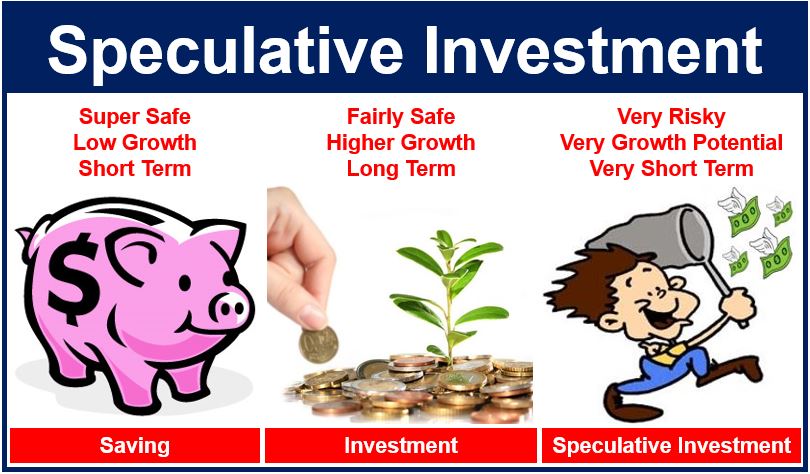What is a speculative investment? Definition and meaning
A speculative investment is one with a high degree of risk where the focus of the purchaser is on price fluctuations. The investor buys the tradable good (financial instrument) in an attempt to profit from market value changes.
We call somebody who makes a speculative investment a speculator. He or she is less concerned with the fundamental value of a security, and more on price movements. The investor doesn’t care about the annual income the asset may bring, such as dividends or interest payments. What matters is how much he or she can sell it for at a future date.
Speculative investments may occur in markets for real estate, stocks, currencies, antiques, fine art, commodity futures, and collectibles.

With the emergence in 1867 of the stock ticker machine, traders no longer had to be physically present on the stock exchange floor. From then to the end of the 1920s, stock speculation expanded dramatically. In 1900 there were 4.4 billion shareholders in the United States. This number grew to 26 million by 1932.
Angel investors and venture capital portfolios
I spoke to Financeeo chief Jack Morgan, who provided some interesting insights about speculative investments. He explained that it is a strategy that is used mostly by angel investors and venture capital portfolios, where each investment carries a huge amount of risk, but also incredible potential upside.
Within each portfolio, one successful investment will usually cover the loss of the rest of the entire portfolio. These are typically companies that are establishing themselves as a monopoly in a new space.
A great example of an investor who leverages this strategy is Peter Thiel, who was the first to invest in Facebook. He knew it carried massive risk, but also believed that if it worked out it would be a monopoly in the social media space. We all know what the social media platform’s outcome was.
Facebook would have paid for all his losses for the next 10 years. Thiel has since invested in many more successful startups including Tesla and Uber
Speculative investment vs. an investment
Investment refers to the application of resources (money) to make more money, or the buying of goods that are not consumed today, but are used to create future wealth.
Investments typically provide income plus growth thanks to the compounding effect. A great example of this is P2P lending. Investors lend money to borrowers in exchange for interest payments. According to p2pempire.com, lenders reinvest their returns which leads to the exponential growth of their investments. The term P2P stands for Peer-to-Peer.
Many experts say a speculative investment is simply an investment with more risk. However, the definition varies widely among academics, legislators and pundits.
The US Commodity Futures Trading Commission defines a speculator (in commodity futures) as:
“A trader who does not hedge, but who trades with the objective of achieving profits through the successful anticipation of price movements.”
Cambridge Dictionaries Online defines a speculative investment as follows:
“An investment that carries a high level of risk of loss, or the activity of investing in these types of investment.”
Put simply, one could say that a speculative investment is just about growth, while an investment is about income plus growth.
A speculative-grade bond is defined by Moody’s as one with a Ba or lower rating, a BB or lower by Standard & Poor’s, or an unrated bond (source: Nasdaq Business Glossary) We call high-yield high-risk bonds junk bonds.
Example of a speculative investment
Imagine you live in a fictitious country called Malandia, and its currency is the malan. There are 100 malans to one US dollar.
Malandia’s main export is oil. In fact, oil makes up more than 90% of the country’s hard currency earnings. A hard currency is one that people trust and expect to maintain its value, such as the US dollar, British pound sterling, euro, Swiss franc and Japanese yen.
You read that most of the world’s experts predict the price of crude oil globally will plummet by more than 60% over the next two months and stay low for at least two years.
You believe this will trigger a severe devaluation of the malan. So you convert all your local currency to US dollars. That is a speculative investment. You are just want to make a profit because of the change in value of a currency.
Many people see gold as a safe haven during turbulent times. However, the price of this precious metal fluctuates, sometimes significantly; meaning that it is a speculative investment.
Although speculation is frowned upon, speculators play a vital role in the market by providing much needed liquidity.

